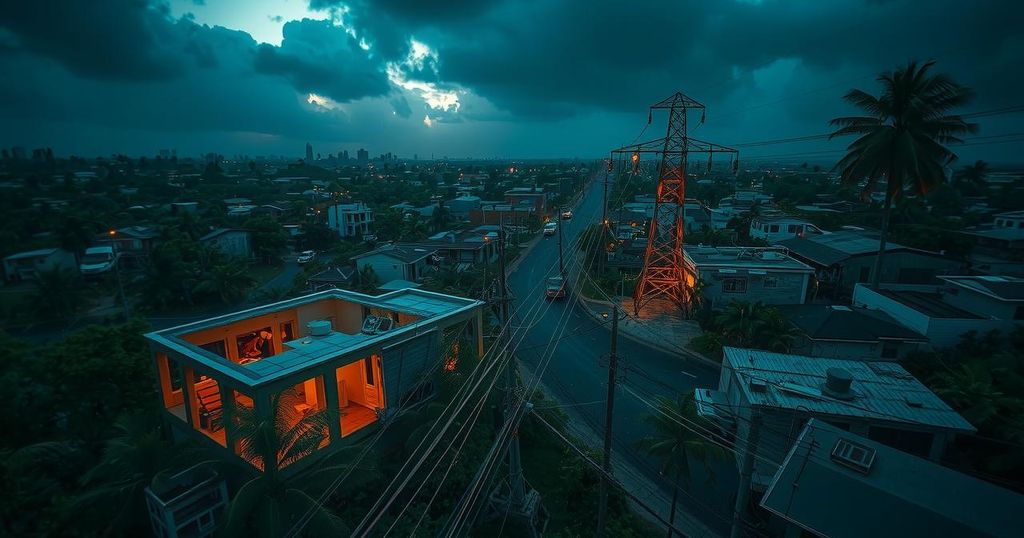Cuban Power Crisis Deepens as Hurricane Oscar Approaches
Millions of Cubans have experienced their third consecutive day without power due to failures in the energy grid, exacerbated by the impending arrival of Hurricane Oscar. Efforts to restore electricity have been hampered by recurrent blackouts, leading to significant disturbances in daily life, including food supply and healthcare services. As the situation develops, frustration grows among citizens facing the stark realities of their infrastructure’s limitations.
Cuba continues to grapple with a significant power crisis as millions remain without electricity for the third consecutive day. Recovery efforts faced a setback when the aging energy grid succumbed to overload after a temporary restoration of power, leading to a complete blackout across much of the nation. The Cuban Electrical Union reported that approximately 16% of the grid had been restored before the failure occurred late Saturday. This incident marks the third substantial failure of Cuba’s energy infrastructure since the onset of the crisis on Friday, resulting in prolonged outages for the majority of its 10 million residents. The looming threat of Hurricane Oscar, which is anticipated to make landfall on the northeastern coast of Cuba, is likely to exacerbate an already dire situation. As of early Sunday morning, Hurricane Oscar reached Inagua Island in The Bahamas, boasting maximum sustained winds of 80 mph. Meteorological forecasts suggest that, despite expectations for weakening post-landfall, the storm may still retain tropical storm strength as it crosses north of Cuba. The crisis precipitated on Friday due to the malfunction of a major power plant, instigating a nationwide blackout. Although officials announced efforts to gradually restore power, the country faced a second comprehensive blackout on Saturday morning. This situation endangers the nation not only by disrupting electricity but also by threatening essential services related to water supply and food preservation. In Havana, long lines formed at bread shops, and citizens expressed frustration over missed opportunities to purchase goods amid the chaos. In response to the crisis, some residents have taken to social media platforms like WhatsApp to share information about power availability in various neighborhoods, while others coordinated to preserve medications during brief intervals of power restoration. Foreign visitors have reported that key infrastructure, including the José Martí International Airport in Havana, functions on emergency backup systems, casting a spotlight on the challenges facing the country’s essential services. Cuban officials have attributed the ongoing energy issues to multiple factors, including stringent U.S. economic sanctions, disrupted supply lines from previous hurricanes, and an impoverished infrastructure. In a recently televised statement, Prime Minister Manuel Marrero Cruz acknowledged that the government halted numerous economic operations to prioritize power generation for the populace. Meanwhile, Health Minister José Angel Portal Miranda confirmed that health services continued to operate using backup generators, emphasizing the importance of maintaining vital healthcare during these tumultuous times.
The current power crisis in Cuba is symptomatic of long-standing infrastructural issues exacerbated by recent natural disasters and external economic pressures. The electrical grid, which has faced repeated failures, has been described as aging and in dire need of investment and repair. The recent hurricanes, including Hurricane Oscar, complicate recovery efforts significantly. Additionally, the impact of U.S. economic sanctions on Cuba has led to challenges in securing necessary resources, which has further hampered the maintenance and expansion of infrastructure. The ongoing blackouts disrupt not only daily life but also threaten the food supply and healthcare services, underscoring the importance of stable electricity in a society that relies heavily on it for survival.
In summary, the ongoing power crisis in Cuba highlights the fragility of the nation’s energy infrastructure and the compounded challenges posed by external factors such as hurricanes and economic sanctions. As millions continue to endure prolonged outages, the situation is likely to worsen with the impending arrival of Hurricane Oscar, which threatens to impede recovery efforts further. The government’s struggle to balance economic activities with power generation reflects the complexity of the challenges faced by the Cuban populace during these trying times.
Original Source: www.cnn.com




Post Comment